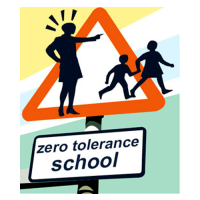We’ve been discussing the problem of juvenile justice, and we’ve seen a lot of alarming reports about the school-to-prison pipeline that is decimating the African-American community, wrecking havoc on government budgets, and enriching the pockets of private prison stock holders.
Experts point to the fact that any child in a school environment and culture that relies on one size fits all strict “zero tolerance policies” has a much higher probability of being suspended or worse expelled from school. As Damario Solomon Simmons says, this is coupled with the continued legacy of racism, so only about 50% of Black males are graduating from high school. The correlation between doing out of school suspensions or expulsions and eventually being locked-up has been proven, and as Solomon Simmons says, feeds an ever growing Prison Industrial Complex that currently has almost 1 million Black men incarcerated.
You can watch a brief video by CNN, which looks at a young family whose 3 year-old has been suspended from pre-school a whooping 5 times!
Pre-K suspensions feed into school-to-prison pipeline
Such pre-K suspensions unfairly target black students, feeding into the school, or rather pre-school-to-prison pipeline.
You can also read more about this: http://www.washingtonpost.com/posteverything/wp/2014/07/24/my-son-has-been-suspended-five-times-hes-3/
Here is what research shows: kids who are suspended or expelled from school are more likely to drop out, and those dropouts are more likely to end up with criminal records. In many places, school discipline pushes kids directly into the juvenile justice system; a school fight can even end in an arrest for assault.
Education and civil rights groups have dubbed this phenomenon the “school-to-prison pipeline.” There are big racial differences in how school discipline is meted out: students of color are much more likely to be suspended or expelled that white students, even when the infractions are the same.
A new study on discipline in the nation’s public schools shows that this gap is present very early (at age 3 and 4): black children make up 18 percent of preschoolers, but make up nearly half of all out-of-school suspensions.
- Across age groups, black students are three times more likely than white students to be suspended.
- While boys make up the large majority of students who are suspended (about eight in 10), about 12 percent of black girls are suspended and 7 percent of Native American girls are suspended. That’s a rate higher than that of white boys (6 percent).
- Black students make up about 16 percent of enrolled students, but make up more than a quarter of all students who are referred to the police.
- Native Americans are also overrepresented among the suspended. They make up one percent of enrolled students but two percent of the suspended.
- Students with disabilities make up about 12 percent of the student population, but they make up 75 percent of those restrained at schools. There’s a racial gap there, too: blacks are about 19 percent of the population with a disability, but make up more than a third of students who “are restrained at school through the use of a mechanical device or equipment designed to restrict their freedom of movement.
- English-language learners were underrepresented among the suspended.
The report doesn’t specify why there are such glaring disparities in school punishment, much less why those begin in preschool.
What has been your experience? Do you have any to share? We would love to hear from you!








